The Power of Customer Testimonials: 9 Reasons to Use Social Proof on Your Website

What was the last thing you bought?
Whether it was the latest-and-greatest tech toy, a must-have beauty product, or a mouthwatering burger at a new restaurant, you probably bought it because you got a great recommendation from a friend — or you meticulously scoured internet reviews for the scoop on a particular product or service.
When it comes to purchasing decisions, consumers religiously follow word-of-mouth recs — virtual or IRL — from peers and unbiased others.
Product reviews are 12 times more trusted than product description or copy coming directly from brands, and a near 70% of online consumers check reviews before buying. Other data reveals that 82% of Americans seek recommendations from friends and family before making a purchase. What’s more, 88% of consumers trust user reviews as much as personal recommendations.
These numbers represent a profound insight for small businesses and entrepreneurs.
When it comes to handing over their hard-earned $$$, consumers are more likely swayed by endorsements from trusted peers and unbiased others during the decision-making process, not the companies peddling the products. Word of mouth matters.
Shared Hosting That Powers Your Purpose
We make sure your website is fast, secure, and always up so your visitors trust you. Plans start at $2.59/mo.

What Is Social Proof?
Social proof = sway. Essentially, it’s a fancy term for the truism that people follow the crowd. Social proof manifests itself in different ways, but companies who want to boost their bottom line will employ elements of social proof on their website to build trust with customers, increase your conversion rate, and establish a powerful brand image.
So what does social proof look like online? Examples of social proof include:
- Instagram post likes
- customer testimonials
- online rating systems
- influencer and celebrity endorsements
- proudly-displayed certification or credentials badges
- social media shares
- large social media followings
- media mentions
- user or subscriber counts
- awards
- client icons
The most successful companies utilize one (or more) of these tools on their sites.
Long story short: there’s immense power in social proof. And more often than not, the presence or absence of social proof on your e-commerce site will be the make-it-or-break-it factor in your business earning five-star online reviews, loyal customers, and abundant sales.
Not convinced yet? Let’s explore nine reasons why your website needs social proof. Plus, we’ll share some of the IRL websites of businesses who are nailing social proof.
Related: 10 Easy Social Media Tips for Your Hard-Working Small Business
9 Reasons to Use Social Proof on Your Website
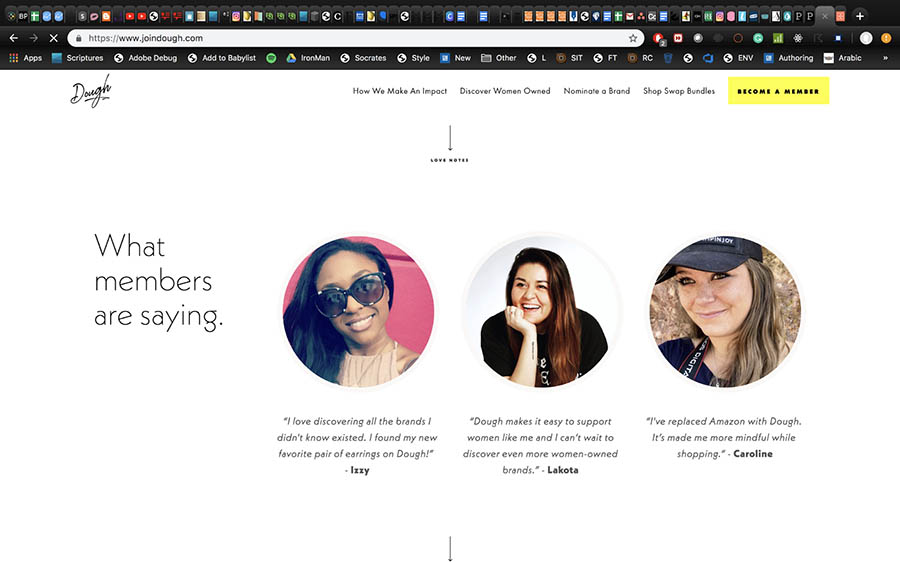
1. Social Proof Creates — and Sustains — Customer Trust
It’s great that your product can do XYZ and has a list of gold-star features. But unless you’ve got an army of brand ambassadors, potential customers aren’t going to buy it — literally or figuratively.
Employing social proof assures prospective customers that your sales pitch echoes the actual experience of people who have done business with you and isn’t just a marketing tactic. Consumers need multiple unbiased opinions that your product or service is going to do what you say it will.
Social proof elements help shoppers trust that your business is legitimate, persuading them that there are real fans of your product or service. Validation through social proof adds credibility and authenticity to your business.

2. Social Proof Utilizes the Influencing Power of Your Customers
Your customers aren’t merely sales numbers; they’re powerful tools of persuasion that can help you grow your business. Social proof allows you to utilize an authentic marketing strategy that can effectively sway customers disillusioned by modern clickbait, sponsored ads, and false claims.
Whether you’re sharing five-star ratings, video testimonials, or a list of your high-profile clients, social proof allows you to take advantage of the substantial selling power of your customers.
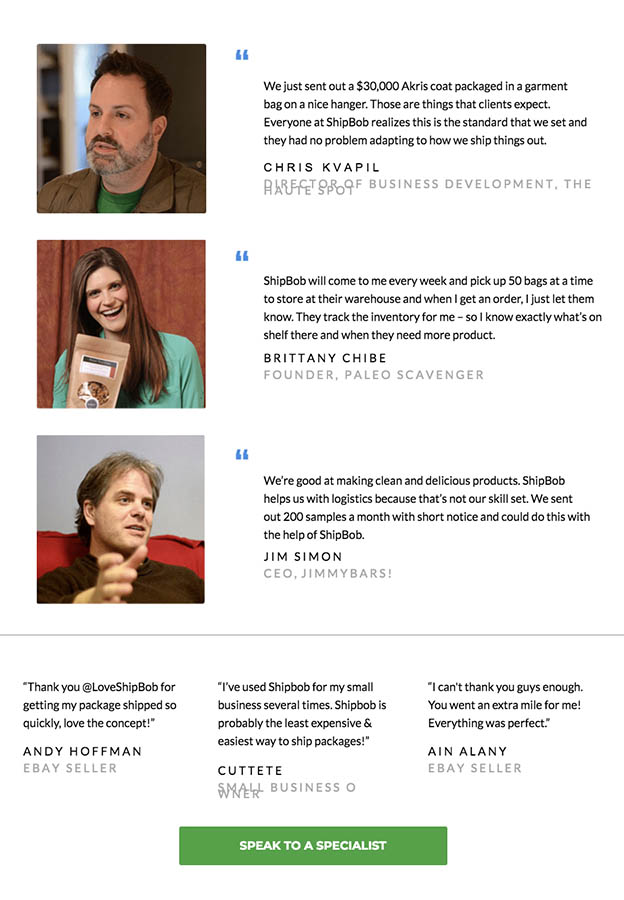
3. Social Proof Shows Customers You Care
Social proof isn’t just about proving to consumers that they should get on your business bandwagon (because #FOMO). It’s also about demonstrating that you care about the customer experience and that you value the opinions of your customers enough to share them with others.
What’s more — when you display badges, certifications, and awards, you show that you care about safety, quality, knowledge, and growth. It makes it apparent that your company fosters engagement, sustainability, and customer loyalty.

4. Social Proof Distinguishes Your Business From Competitors
It’s likely that the competition in your industry is fierce. You need to set yourself apart to build a business with staying power and a bottomless bottom line. By using elements of social proof on your website, you separate yourself from other marketers and show consumers what makes your brand different. Why should they choose you over another brand? Let your customers do the talking.

5. Social Proof Identifies Your Target Customers
Just like shoppers are looking for something specific, so is your business. Finding your target audience assures that you make more high-quality sales, establish long-lasting customer relationships, and grow a sustainable business.
Use social proof to help consumers know who your ideal customer is, and how your product or service will benefit them specifically. As they identify with relatable qualities, they’ll more effectively envision themselves as satisfied using your product, and you’ll enjoy higher conversion rates.
This benefit of social proof also validates current and past customers, helping followers connect more strongly with your business as they line up with target audiences. Plus, by appealing to your target customers through social proof, you’ll demonstrate you’re in-tune with your market, proving you understand them and their needs.

Get Content Delivered Straight to Your Inbox
Subscribe to our blog and receive great content just like this delivered straight to your inbox.
6. Social Proof Highlights Selling Points
Losing things, forgetting an appointment, smelling bad — there are a lot of things that trouble people. For every pain point, there’s a business looking to alleviate that consumer concern. What about your product or service meets a glaring customer need?
Social proof on your website allows you to highlight the key selling points and features of your product and identify how it can relieve consumers’ most troubling problems. Without boring or exhausting them with repetitive, overly-confident, and schmoozy digital marketing, keep things fresh by illustrating the many attractive features of your product or service through customer proof. You’ll help customers make a decision and give your business dimension.

7. Social Proof Follows Consumer Purchasing Patterns
Let’s turn that old parental adage on its head: “If all your friends were buying the latest gadget, would you do it too?” Well, science says yes, it’s likely.
When deciding where to divvy their dollars, consumers aren’t taking your word for it — they need social validation from their peers (including virtual ones) to confidently make purchases. Reviews rule in the e-commerce biz.
Social proof aligns with how consumers shop, meaning your efforts to outfit your site with social evidence and customer proof have the potential to yield a massive ROI. Because consumers adapt their purchasing patterns to follow the trends and behaviors of the crowds, your business needs to utilize the enormous marketing power of previous buyers to influence those on-the-fence shoppers, effectively converting consumers into customers.
Related: How Your Online Business Can Nail Customer Service
Soliciting feedback, highlighting glowing reviews, showcasing testimonials, sharing the feedback of happy customers — these and other tactics appeal to the proven ways that audiences buy. Think like your customers: if loads of satisfied customers put forth the effort to leave a review of your product, it must be good. And let’s face it — these days, customers aren’t buying anything without even glancing at some of those reviews.
By employing social proof, you’re working with the psychology of sales and proving your business’ virtual street-smarts.
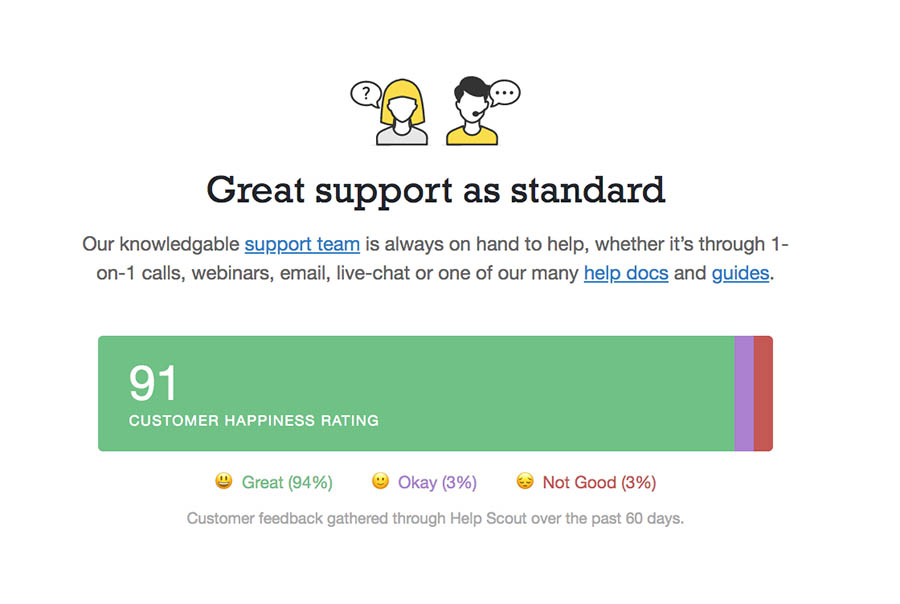
8. Social Proof Builds Your Brand Image
It’s good to have a successful, growing business. But you want more; namely, a strong, positive brand image. Social proof can elevate your influence by spreading that all-important virtual word-of-mouth and increasing your visibility. Be a well-respected, well-known, and high-sales leader in your field by establishing your business as an authority through social validation.
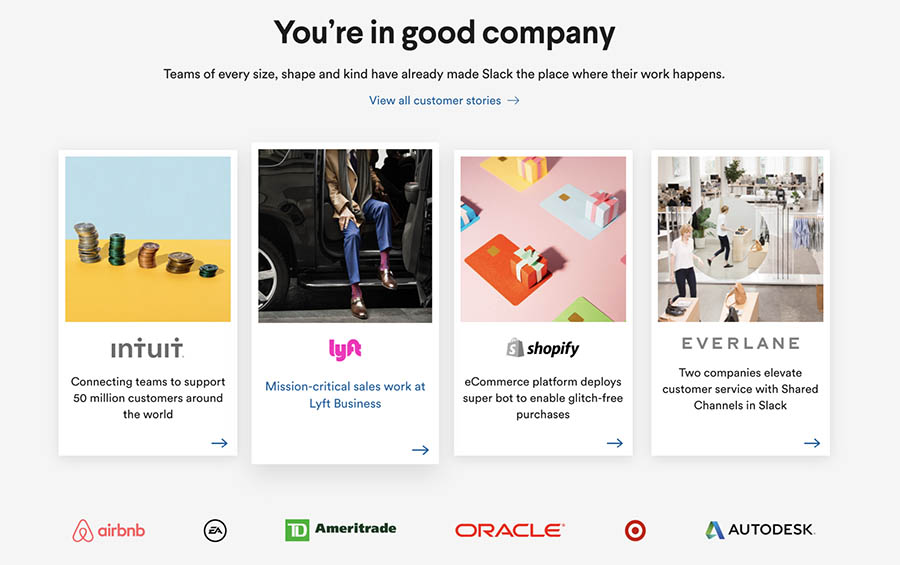
9. Social Proof Creates User-Generated Content
Every website owner knows content is king. As a business owner, you need content to incentivize consumers to come to you and care about your brand and offerings.
With social proof, your customers supply valuable content that you can promote on your site to grow traffic and increase engagement. Doing the work to solicit reviews, customer stories, and press coverage provides you with useful content that can fill company blog posts, draw eyes, and give you fodder for your sales funnels.
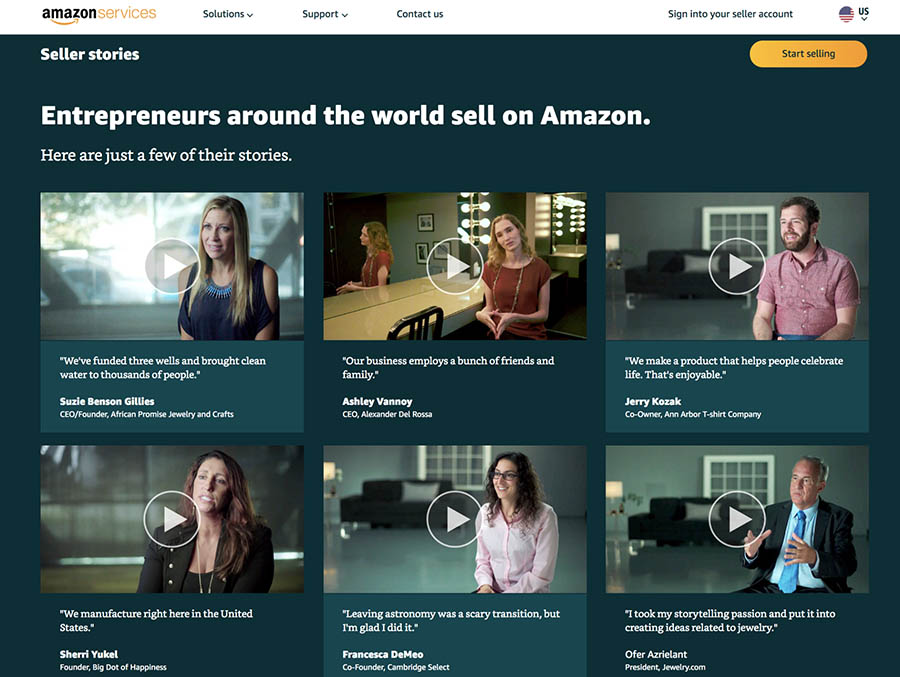
Your Mission: Increase Conversions with Positive Reviews
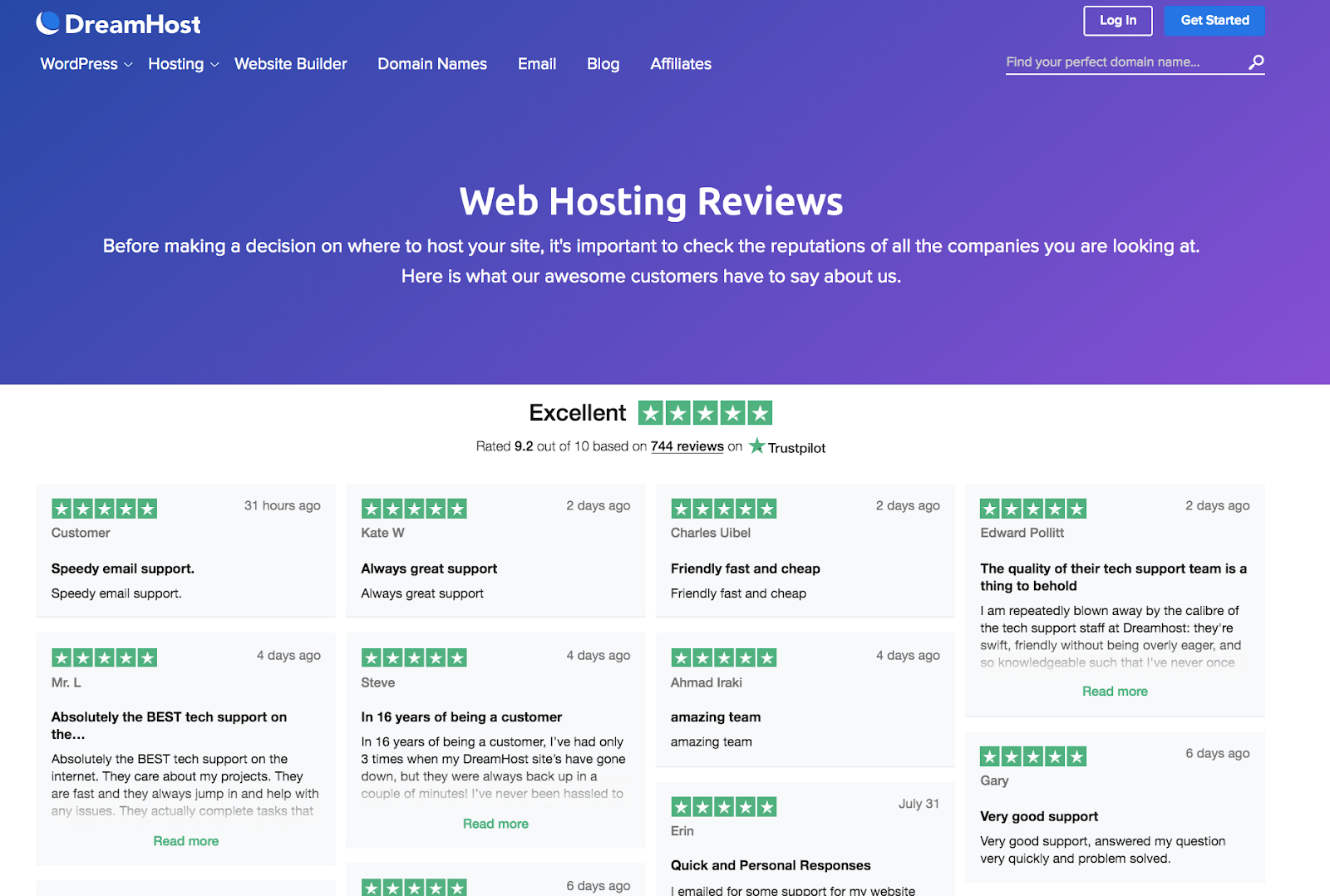
Now that you’re convinced of the importance of social proof, you’re going to need a website to display those five-star reviews proudly. We’d recommend starting with DreamHost’s Shared Hosting — the easiest way to get everything you need to thrive on the web. And with plans starting at just $2.59 per month, building social proof for your brand won’t break the bank. Need a second (or third) opinion? Read what our customers have to say.